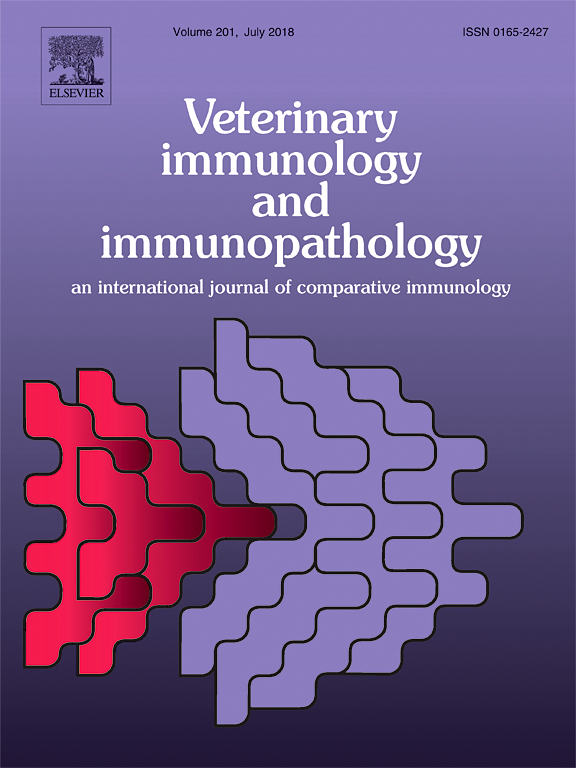Ver ítem
- xmlui.general.dspace_homeCentros Regionales y EEAsCentro Regional Santa FeEEA RafaelaArtículos científicosxmlui.ArtifactBrowser.ItemViewer.trail
- Inicio
- Centros Regionales y EEAs
- Centro Regional Santa Fe
- EEA Rafaela
- Artículos científicos
- Ver ítem
Immune response and functional role of antibodies raised in heifers against a Staphylococcus aureus CP5 lysate and recombinant antigens vaccine formulated with Iscom Matrix adjuvant
Resumen
Staphylococcus aureus is the most frequently isolated pathogen from bovine intramammary infections worldwide. Commercially available vaccines for mastitis control are composed either of S. aureus lysates or inactivated whole-cells formulated with traditional adjuvants. We recently showed the ability of a S. aureus CP5 lysate vaccine adjuvanted with Iscom Matrix to generate a longer lasting specific antibody response in blood and milk, with improved
[ver mas...]
Staphylococcus aureus is the most frequently isolated pathogen from bovine intramammary infections worldwide. Commercially available vaccines for mastitis control are composed either of S. aureus lysates or inactivated whole-cells formulated with traditional adjuvants. We recently showed the ability of a S. aureus CP5 lysate vaccine adjuvanted with Iscom Matrix to generate a longer lasting specific antibody response in blood and milk, with improved opsonic capacity, compared with a S. aureus CP5 whole-cell formulation. The aim of the present study was to obtain an experimental immunogen composed of lysed cells of a CP5 S. aureus strain supplemented with recombinant clumping factor A, fibronectin binding protein A and β-toxin formulated with Iscom Matrix, characterize the immune response generated when immunizing pregnant heifers and assess the functional role of antibodies raised against this immunogen in experimental models. Both a lysate vaccine and a lysate + recombinant antigens vaccine elicited antibodies that promoted neutrophil phagocytosis and inhibited internalization into mammary epithelial cells, in vitro. Incorporation of defined antigenic molecules to the lysate formulation elicited a strong specific humoral immune response against both lysate and recombinant antigens and was associated with higher expression of regulatory and pro-inflammatory cytokines. In addition, antibodies were efficient for blocking S. aureus binding to bovine fibrinogen and fibronectin, and neutralizing β-toxin effect in vitro, placing these antigens as candidates to be included in a formulation directed to prevent staphylococcal bovine mastitis.
[Cerrar]

Autor
Camussone, Cecilia;
Pujato, Nazarena;
Renna, María Sol;
Veaute, Carolina Melania Isabel;
Morein, Bror;
Marcipar, Iván Sergio;
Calvinho, Luis Fernando;
Fuente
Veterinary Immunology and Immunopathology 162 (3–4) : 96-107 (December 2014)
Fecha
2014-12-15
ISSN
0165-2427
Formato
pdf
Tipo de documento
artículo
Palabras Claves
Derechos de acceso
Restringido
 Excepto donde se diga explicitamente, este item se publica bajo la siguiente descripción: Creative Commons Attribution-NonCommercial-ShareAlike 2.5 Unported (CC BY-NC-SA 2.5)
Excepto donde se diga explicitamente, este item se publica bajo la siguiente descripción: Creative Commons Attribution-NonCommercial-ShareAlike 2.5 Unported (CC BY-NC-SA 2.5)

